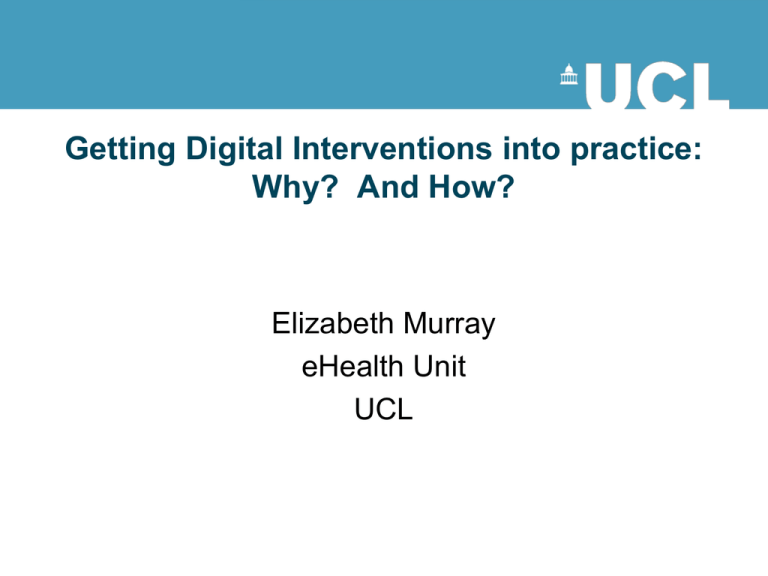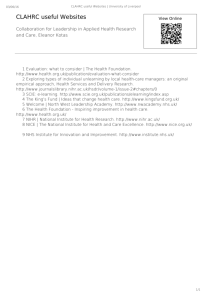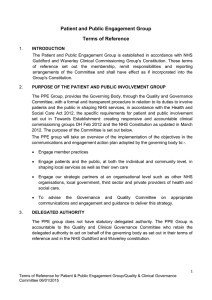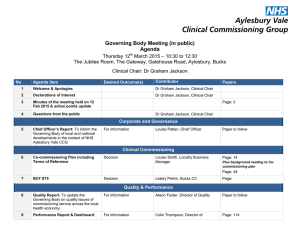Getting Digital Interventions into practice: Why? And How? Elizabeth Murray
advertisement

Getting Digital Interventions into practice: Why? And How? Elizabeth Murray eHealth Unit UCL Why bother? Digital Interventions • Small effects • Most costs incurred during development; relatively small marginal costs per additional user Implications • Need lots of users for population impact • Need lots of users for cost effectiveness • Moral imperative for academics with public funding • Commercial developers require ROI Is it happening? • Not really • Systematic reviews of DI in diabetes, hypertension, asthma all show same story: DI developed, trialled, and then not used. • A few notable exceptions – Smoking: Stop Advisor; Txt2Stop – Mental health: Beating the Blues, Fear Fighter, LLTF – Alcohol – Down Your Drink Kingston. How to do it? HeLP-Diabetes: An (imperfect) case study • Think about implementation right from the start: – Writing the initial grant application – Developing the intervention – Thinking about what evaluations to undertake • Use an appropriate theoretical framework – Normalization Process Theory http://www.normalizationprocess.org/ Normalization Process Theory May & Finch; Sociology 2009; 43(3):535-554; www.normalizationprocess.org/ Coherence Theory HeLP-Diabetes Do I understand this “thing”, and how it differs from other, similar “things”? Self-management support for people with type 2 diabetes Is it easy to explain and differentiate? Yes. Other selfmanagement programmes are group-based, H-D is online. Holistic approach. Cognitive Participation Theory Having understood what “it” is, is it something I / we want to take part in? HeLP-Diabetes Yes. DH and NHS policy promotes self-management. Diabetes accounts for 10% of NHS costs Self-management reduces risks of complications (and hence costs) in DM Low take up of group based education GPs appreciate holistic approach Collective Action: Impact on work Theory Interactional workability (impact on consultations) Skill set workability (fit with existing skill sets, need for training) Relational integration (impact on relationships between different professional groups) Contextual integration (fit with organisational needs) HeLP-Diabetes Addressed ++ in design, user input +++ Initially planned for nurses to support patients in use, found HCA better. Important for all content to be NICE compatible Yes at CCG level, variable at practice level Reflexive Monitoring Theory Having engaged with this change, does it seem worth it? Formal and informal evidence / feedback HeLP-Diabetes RCT: • effectiveness • cost-effectiveness Implementation Study: • Uptake at practice & patient levels • Impact on patients Informal: • Patient feedback • GP / CCG feedback If that was the plan, what actually happened? 1. Health and Social Care Act 2012 = massive change in the NHS. 2. GP workload soared – previously acceptable impact on work no longer possible. 3. QOF reimbursement introduced for “structured education”. H-D not structured. Current state: 1. Host CCG(s) very keen and supportive Good uptake at practice level (2/3) Variable uptake at patient level (n = 160 after 1 year) Opportunity to trial multiple implementation pathways: • practice led, patient led, intermediate services, OPD, IAPT • Lots of adaptation and change (e.g. HCA to support patient use; self-registration) 2. Developed & piloting “structured education” (with email facilitation) for QISMET accreditation 3. Widespread interest from other CCGs Commercialisation 1. Establish Principles: – – – Free at the point of use (NHS service; NIHR funding) Maintain integrity of intervention Promote future research, development, sustainability 2. Establish a Community Interest Company (CIC) – Assistance from UCLB; Improvement Science London; HeFCE UnLtd; Health and Social Innovation Programme; NIHR. 3. Obtain Contracts (!). What have we learnt? • Implementation is important • Think about it from the very beginning • Integrate it into all phases of your research – development, evaluation, • Use theory • Accept the need to be responsive and adaptable • Approach it as you would any other academic exercise – seek advice, share learning, generate generalisable data, maintain integrity.










